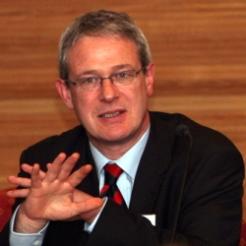The chief executive of the Scottish Council for Voluntary Organisations (SCVO) has released a damning appraisal of the UK government's treatment of the voluntary sector in the context of its response to last week's riots.
The riots revealed England to be a "deeply divided and damaged society on a scale which is hard to take in", Martin Sime, SCVO chief executive said in an opinion piece on the SCVO website, slating the UK government's response to the crisis as "beyond inept". He said that for Scotland, now is a time "to appreciate what we have" and to "pat our politicians on the back" in their response to a constricted budget, where the voluntary sector is seen as "part of the answer".
The English political response has been in stark contrast to that of Scotland, he advised, accusing the UK government of "penalising the unemployed, harassing the disabled, demonising the young" and of having "racist immigration policies". "It's a narrative which sounds too much like the haves trying to hold onto their privileges", he added.
He also criticised the UK government's flagship Big Society programme:
"By and large in Scotland we’ve managed to resist any temptation to create a Big Society programme, which has revealed itself down south to be no more than a cynical public relations cover for cuts," he said. "Just for once we should spare a thought for our counterparts in England who have to work in such a dismal context."
NCVO response
Responding to Sime's comments Karl Wilding, head of policy and research at SCVO's English equivalent, the NCVO, remained positive about the voluntary sector's part in the post-riot clean-up:
"Voluntary organisations will play a leading role in rebuilding communities following the disturbances because they are the best at unlocking the abilities and assets of our communities and at helping people to help themselves.
"We have already heard many inspiring examples of how organisations are helping to bring communities together and supporting those who have been affected in the disturbances. We expect to hear many more at our planned summit meeting in September, which will bring together local infrastructure bodies and voluntary organisations to reflect on what has happened and explore how the sector can help communities to rebuild."
Earlier this month the SCVO accused the NCVO, of underestimating statutory funding cuts to Scotland in its Counting the Cuts paper. It said that the true loss to the Scottish voluntary sector could be £200m, rather than the £20.4m calculated by the NCVO.
Sime has given evidence to the Scotland Bill which is currently passing through Parliament. Under the Bill the UK Treasury will deduct 10p from standard and upper rates of income tax in Scotland and give MSPs the power to decide how to raise cash. A corresponding reduction in the Scottish block grant (funds received from the UK government) will see Scotland's budget reduced by approximately £1bn. SCVO's director of public affairs, John Downie, matched Sime's support for the Scottish government saying:
"We are confident that the Scottish government will not pass on a cut of anywhere near this size but continue to invest in the third sector, to ensure that the sector can increase its economic contribution, have a stronger presence in delivering public services and to use its expertise in employability to create opportunities for our young people."









